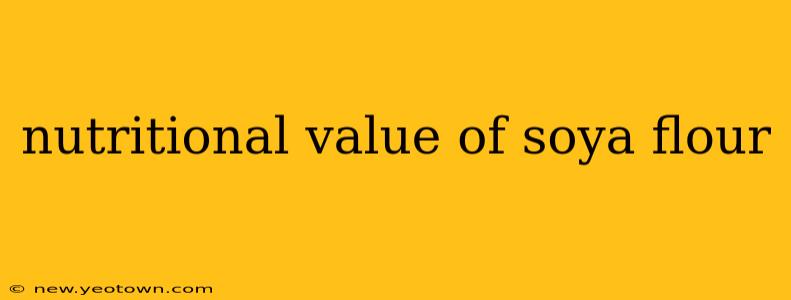Soya flour, derived from soybeans, isn't just a trendy ingredient; it's a nutritional powerhouse packed with benefits for your health and wellbeing. For centuries, soybeans have been a staple in Asian cuisine, and now, soya flour is gaining popularity worldwide thanks to its versatility and impressive nutritional profile. But what exactly makes it so special? Let's unravel the secrets of this humble ingredient and explore its remarkable nutritional value.
What is Soya Flour and How is it Made?
Imagine taking soybeans, removing their hulls and cotyledons, then grinding them into a fine powder – that’s essentially how soya flour is made. This process preserves many of the soybeans' vital nutrients, creating a versatile ingredient that can be easily incorporated into various dishes. Depending on the processing, you can find different types of soya flour, including defatted and full-fat varieties, each with its unique characteristics and nutritional composition. The process of creating soya flour ensures that the valuable nutrients found in soybeans are preserved and ready to enhance your meals.
What are the Nutritional Benefits of Soya Flour?
Soya flour is a nutritional champion, boasting a remarkable array of vitamins, minerals, and beneficial compounds. Let's delve into the specifics:
Is Soya Flour a Good Source of Protein?
Absolutely! One of soya flour's standout features is its high protein content. It's a complete protein, meaning it contains all nine essential amino acids our bodies need but can't produce on their own. This makes it an excellent choice for vegetarians, vegans, and anyone looking to boost their protein intake.
What are the Vitamins and Minerals in Soya Flour?
Soya flour is a rich source of several essential vitamins and minerals. It’s a good source of iron, crucial for red blood cell production and preventing anemia. It also contains significant amounts of folate, essential for cell growth and development, particularly important during pregnancy. Furthermore, soya flour provides various B vitamins, vital for energy production and overall metabolic health. The impressive array of minerals and vitamins found in soya flour truly makes it a nutritional standout.
Does Soya Flour Contain Fiber?
Yes! Soya flour is a good source of dietary fiber, which is beneficial for digestive health. Fiber aids in promoting regularity, preventing constipation, and supporting a healthy gut microbiome. The fiber content contributes to increased satiety, helping you feel fuller for longer and potentially assisting in weight management.
What are the Other Health Benefits of Soya Flour?
Beyond its impressive macronutrient profile, soya flour offers additional health benefits. The isoflavones present in soya flour are plant compounds with potential antioxidant and anti-inflammatory properties. These compounds have been linked to a reduced risk of certain chronic diseases. The inclusion of soya flour in a balanced diet can contribute to overall health and well-being.
Are there any potential downsides to consuming soya flour?
While soya flour offers numerous benefits, some individuals may experience digestive discomfort such as bloating or gas, especially when consuming it in large quantities. Those with soy allergies should strictly avoid soya flour. Moderation is key, and introducing soya flour gradually into your diet is advisable.
How to Incorporate Soya Flour into Your Diet
The versatility of soya flour is one of its greatest assets. It can easily be incorporated into various recipes, adding both nutritional value and a subtle nutty flavor. It can be used as a partial replacement for wheat flour in baking, thickening sauces, or even added to smoothies for a protein boost. The possibilities are endless, allowing you to creatively incorporate this nutrient-rich ingredient into your daily meals.
Conclusion
Soya flour is more than just a food ingredient; it's a nutritional powerhouse that offers numerous health benefits. From its high protein content and impressive vitamin and mineral profile to its fiber content and potential antioxidant properties, soya flour is a versatile and valuable addition to a healthy diet. By understanding its nutritional composition and diverse applications, you can harness the power of soya flour to enhance your own wellbeing and enjoy a more nutritious and balanced lifestyle. Remember, as with any dietary change, consulting a healthcare professional or registered dietitian is always recommended, especially if you have specific dietary concerns or allergies.

